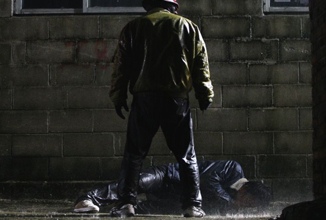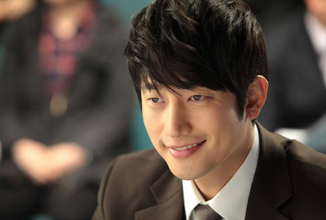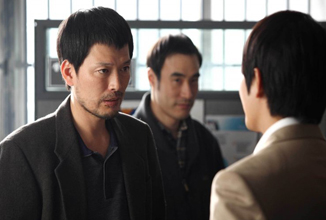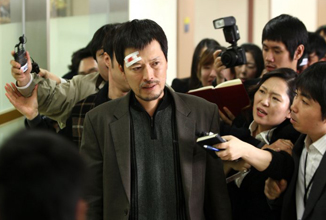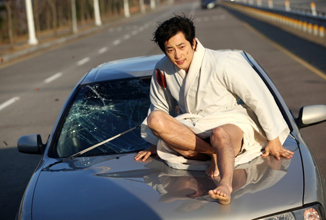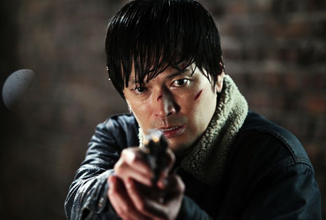
 |
||||||
Review: Confession of Murder begins at a point in 2005 when detective Choi had his final run-in with the (then masked) serial killer. As dark and brutal as they are fast-paced and exciting, these early scenes bring to mind almost a cornucopia of classic Korean cinematic battles between law keepers and breakers from as far back as Die Bad (2000 - directed by Ryoo Seung-wan) - complete with the requisite torrential downpour of rain - through to the masterful Memories of Murder but as a direct result of a number of deliberately elaborate chases contained within the first few minutes of proceedings (accompanied by pulsing musical soundtrack) perhaps the one film they speak of more than any other at this point is The Chaser (2008 - directed by Na Hong-jin). That's no bad thing when all is said and done and while the similarities here are more noticeable than they perhaps ideally should be, the overall effect successfully combines with the conclusion of this 'flashback' segment - showing detective Choi severely injured and able to only watch as the vicious assailant disappears up a dark alley - to deftly build viewer excitement to almost fever pitch in anticipation of the ensuing tale. Though such narrative subject matter conveyed in requisite dark and gritty tones - all the while peppered with brief sidesteps into humour - can hardly fail to bring to mind the masterful Memories of Murder (2003 - directed by Bong Joon-ho), among other examples, there are in fact some major differences in the case of Confession of Murder; not only in the themes present but also in their conveyance:
For a second or two forget the fact that Memories of Murder is based on a true story while Confession of Murder is entirely fictional, through and through (I will come back to that point shortly), one of the numerous reasons that Memories of Murder is cited by so many as a prime example of Korean Cinema as a whole is the utterly exquisite manner by which it merges genres and its ability to deftly move from dark to light, from serious to humorous and back, with every element strengthening and underlining every other. Though Confession of Murder does a fairly decent job of bringing seemingly disparate genres together, the humour (especially) is far more compartmentalised into sections - largely limited to scenes involving the victims' families efforts to abduct Doo-seok - and, as such, feels like a jump between genres rather than genre elements within a cohesive piece. While that fact wouldn't necessarily be that much of an issue in films less likely to bring masterpieces like Memories of Murder to mind, here the reminiscent nature of the darker proceedings make those jumps all the more noticeable; Confession of Murder rather doing itself a disservice, in the process. That said, Confession of Murder does succeed in being engaging and entertaining throughout and could even be said to be gripping at times and genuinely funny at others but there is more than one occasion where specific plot elements - both narrative and action-based - are pushed beyond credulity which would have been far less likely to have been the case in a film based on, for example, a true story (I told you I'd come back to that) or if director Jeong Byeong-gil had been constrained from certain flights of fancy in his efforts to increase viewer excitement or draw separate narrative threads together.
As a final mention of elements reminiscent of classic Korean films, it could also be said that the victims' families' need for closure, revenge and their discussions of what they'll do when they have Doo-seok in their grasp bring to mind similar ideas in Sympathy for Lady Vengeance (2005 - directed by Park Chan-wook) though the aforementioned shift back and forth into comedic territory somewhat offsets these comparisons. However, when all is said and done the many similarities to aspects of all the classic Korean films mentioned if nothing else implies these reference inclusions were likely deliberate, though whether that warrants leeway to be given is up to each viewer to decide for themselves. Confession of Murder was director Jeong Byeong-gil's first feature-length fictional work (having previously made action documentary 'Action Boys' in 2008) but cinematically the film is far more accomplished than would largely be expected from a fairly new film director. The pace is brisk while never feeling rushed and the action scenes especially are pretty much a site to behold. There is the odd moment where an action element doesn't quite obey the laws of physics but, as previously stated, the overall entertainment value is such that most viewers will be willing to let that fly. Visually, Confession of Murder is sumptuous throughout with camera work and musical score combining to maintain viewer engagement and even create excitement at times.
Cast: The DVD edition reviewed here is the Korean (Region 3) KD Media (2-disc) First Press edition. The film itself is provided as an anamorphic transfer with an aspect ratio of 2.35:1 and there are no image artifacts, and no ghosting, present. The picture is noticably nuanced and compliments the visuals perfectly.
• Director: Jeong Byeong-gil
• 'Action' Featurette Finally, the official Showbox Entertainment trailer of 'Confession of Murder' (with English subtitles) is attached below:
|
||||||
All images © Showbox Entertainment, KD Media Review © Paul Quinn |
||||||
